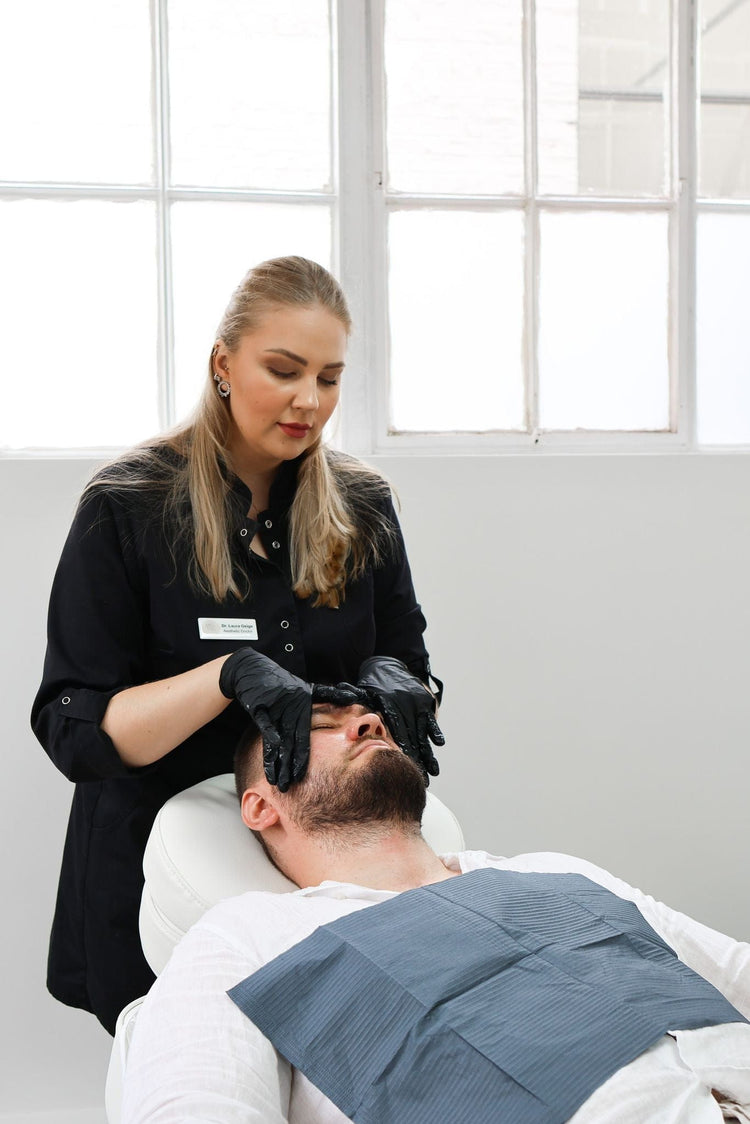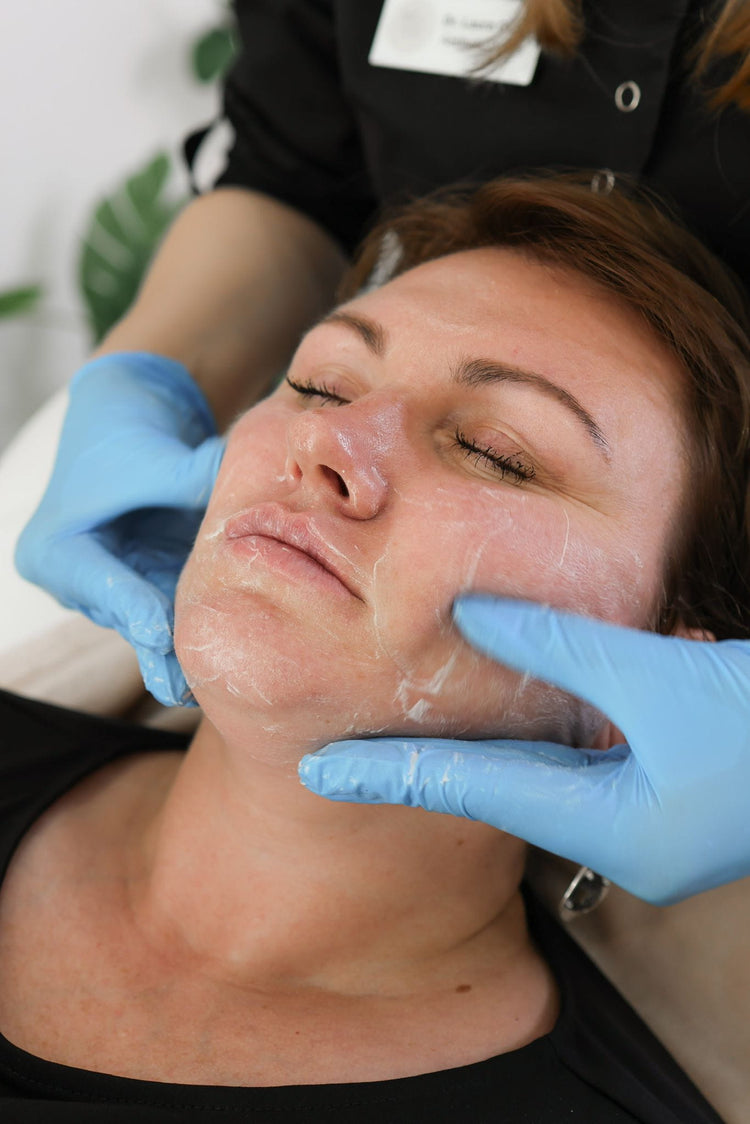Facial Treatments
Facial treatments offer a variety of benefits for achieving healthy and radiant skin. During consultations, dermatologists and estheticians often recommend specific treatments tailored to individual needs and concerns.
Chemical Peels
Chemical peels are a popular facial treatment that involves applying a chemical solution to the skin to remove dead skin cells and promote cell turnover. There are different types of chemical peels, ranging from mild to deep, each targeting specific skin issues such as acne, fine lines, wrinkles, and hyperpigmentation.
Microneedling
Another common treatment recommended during consultations is microneedling.
This minimally invasive procedure uses tiny needles to create controlled micro-injuries in the skin. These injuries stimulate collagen production, resulting in improved skin texture, reduced acne scarring, minimized pores, and a more youthful appearance.
HydraFacial
HydraFacial is a multi-step facial treatment that combines cleansing, exfoliation, extraction, hydration, and antioxidant protection.
This non-invasive procedure uses a patented device to deliver a unique serum solution through a vortex technology system. The HydraFacial process effectively cleanses the pores, removes impurities, reduces fine lines and wrinkles, and leaves the skin feeling refreshed, hydrated, and glowing.
Microdermabrasion
Microdermabrasion is a popular exfoliating treatment that uses fine crystals or a diamond-tipped wand to remove the outermost layer of dead skin cells. This process reveals smoother, brighter skin and can help improve the appearance of fine lines, wrinkles, acne scars, and uneven skin tone.
Anti-Aging Treatments
Facial treatments offer a variety of benefits for achieving healthy and radiant skin. During consultations, dermatologists and estheticians often recommend specific treatments tailored to individual needs and concerns.
Botox
Botox is another treatment commonly recommended during consultations. Botox is a neurotoxin that temporarily paralyzes the muscles responsible for facial expressions. By injecting Botox into these muscles, wrinkles and fine lines can be reduced or eliminated.

Dermal Fillers
Dermal fillers are injectable substances used to add volume and fullness to areas of the face that have lost volume due to aging. Common uses for dermal fillers include plumping up lips, smoothing out wrinkles around the mouth and nose, and restoring lost volume in the cheeks. Fillers typically contain hyaluronic acid, a naturally occurring substance in the skin that helps retain moisture.
Laser Resurfacing
Laser resurfacing is a procedure that uses lasers to remove the top layers of damaged skin, revealing smoother, younger-looking skin underneath.
There are different types of laser resurfacing, including ablative and non-ablative. Ablative laser resurfacing removes more of the skin’s surface and requires longer recovery time but produces more dramatic results. Non-ablative laser resurfacing stimulates collagen production without removing layers of skin and typically has a shorter downtime.

Laser resurfacing can address various skin concerns, such as wrinkles, fine lines, age spots, acne scars, and uneven skin tone.
Acne Treatment
During consultations, dermatologists often recommend a variety of skincare treatments tailored to individual needs. These treatments aim to address common concerns like acne, wrinkles, hyperpigmentation, and uneven skin tone.
Prescription Medications
For acne treatment, dermatologists frequently prescribe medications that target the underlying causes of breakouts. These can include topical retinoids, which help regulate skin cell turnover and prevent clogged pores.
Oral antibiotics may be prescribed to combat bacterial infections contributing to acne. For moderate to severe acne, prescription-strength benzoyl peroxide is often recommended to kill bacteria and reduce inflammation.
In some cases, hormonal therapies such as birth control pills or anti-androgen medications might be prescribed to manage acne related to hormonal fluctuations.
Chemical Peels
Chemical peels are a popular treatment for acne. They work by exfoliating the skin and removing dead skin cells that can contribute to breakouts.
There are different types of chemical peels, ranging from mild to deep, each targeting specific skin issues.
Superficial peels are often used for mild acne and focus on improving skin texture and tone.
Medium-depth peels penetrate deeper into the skin and can be effective for more severe acne, as well as reducing fine lines and wrinkles.
Deep peels are the strongest type of chemical peel and should only be performed by a qualified dermatologist. They can dramatically improve the appearance of acne scarring and other skin concerns.
Extraction
Acne extraction is a manual procedure where a trained professional uses sterilized tools to remove blackheads, whiteheads, and other blemishes from pores. This process can help unclog pores, reduce inflammation, and prevent further breakouts.
It is important to have acne extractions performed by a qualified dermatologist or esthetician as improper technique can lead to scarring or infection.
Skin Concerns
Skin concerns are common and can range from mild blemishes to more serious issues like acne scars, hyperpigmentation, and signs of aging.
Hyperpigmentation Treatments (e.g., laser therapy, chemical peels)
Hyperpigmentation is a common skin concern characterized by areas of darkened skin. Treatment options for hyperpigmentation often involve targeting melanin production or breaking down existing pigment.
Laser therapy uses concentrated light energy to target and destroy pigmented cells, leading to a reduction in the appearance of dark spots.
Chemical peels utilize chemical solutions to exfoliate the skin’s surface, removing dead skin cells and encouraging cell turnover, which can help lighten hyperpigmentation.
Rosacea Management (e.g., topical creams, IPL treatment)
Skin concerns are common and can range from mild blemishes to more serious issues like acne scars, hyperpigmentation, and signs of aging.
For rosacea management, topical creams containing ingredients like metronidazole or azelaic acid can be prescribed to reduce redness, inflammation, and bumps.
IPL (intense pulsed light) treatment is another effective option for rosacea. IPL therapy uses targeted light energy to heat and destroy the blood vessels that contribute to facial flushing and redness.
It’s important to consult with a dermatologist to determine the best treatment approach for individual rosacea symptoms and skin type.
Eczema and Psoriasis Management (e.g., moisturizers, topical steroids)
Eczema and psoriasis are common skin conditions that often require ongoing management. For eczema, moisturizers containing ceramides or hyaluronic acid are crucial to maintain skin hydration and prevent dryness and irritation. Topical steroids can be used to reduce inflammation and itching in flare-ups. Calcineurin inhibitors, such as tacrolimus or pimecrolimus, may also be prescribed for short-term use to control inflammation.
Psoriasis is characterized by thick, scaly patches of skin. Treatments often involve topical therapies like vitamin D analogs or retinoids to slow down skin cell growth and reduce scaling. Coal tar can also be used to help control symptoms. In more severe cases, systemic medications such as methotrexate or biologics may be recommended.
Learn more about the best treatments for pigmentation at It’s Me & You Clinic
- Why CBD Infused Gummies Are So Popular In The UK - November 9, 2025
- What Is The Best Non Surgical Facelift For 2024? - November 7, 2025
- What Are The Benefits Of THC Drinks Over Smoking? - November 6, 2025
